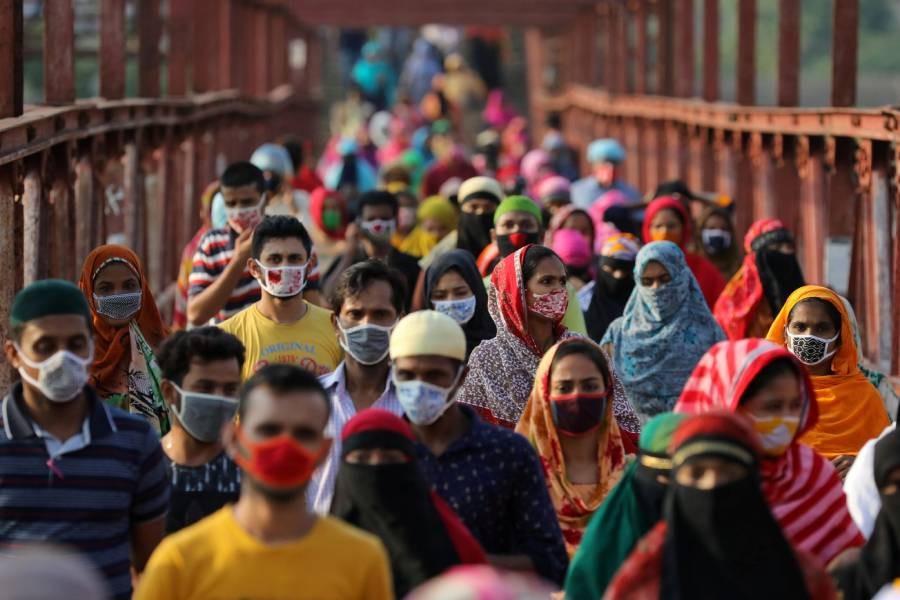
Published :
Updated :

Health experts on Monday predicted a mild resurgence of Covid-19 infection in the country during the upcoming summer.
The rate of infection has been rising for the last couple of weeks.
They, however, said there could be an increase in the rate of transmission, but it is unlikely to last for long. They, at the same time, warned of the entry of new variants from other sources.
The experts also favoured the government's move to reopen the educational institutions. The closure has already had a negative impact on society and students in particular.
All these views came at a seminar on 'One Year of Corona: Success and Challenge'.
The Bangladesh Health Reporters' Forum (BHRF) and the Bangabandhu Sheikh Mujib Medical University (BSMMU) jointly organised the seminar at the university's Shaheed Dr Milon Hall.
Health minister Zahid Maleque was present at the seminar as the chief guest. Additional director general (administration) of DGHS Prof Dr Nasima Sultana made the keynote presentation on the occasion.
Four panellists took part in discussion on the keynote paper.
Former vice chancellor of BSMMU and virologist Prof Nazrul Islam said four virus variants-Influenza A, Para Influenza 3, Rhinovirus and Respiratory Syncytial Virus-are usually found active in Bangladesh during the winter season.
"If one type of virus attacks a person's cell, other types of virus cannot enter the same cell. That's why the rate of detection of Covid-19 cases declined to a low-level in Bangladesh when the number of Covid cases was surging everywhere in the world," he added.
But there would be a mild wave in Bangladesh during this summer as the detection rate of new cases has gone up since March 01 which was below 2.0 per cent before that, said the noted virologist.
"Although the number of cases will rise, it will not increase much as people have already started developing antibody. About 74 per cent of slum dwellers, according to a study, had antibodies against coronavirus. Besides, vaccine will stop coronavirus transmission," he noted.
Prof Nazrul Islam suggested conducting a thorough research by IEDCR. He also suggested the health minister allocate a lump sum amount of money in favour of IEDCR to carry out research to understand the coronavirus trend.
In his remarks, SWACHIP president Prof Dr Iqbal M Arsalan said the main challenge, after one year of corona in Bangladesh, is the re-emergence of the virus. New variant especially one found in UK in January might prove fatal if it enters Bangladesh. Measures should be taken to tackle this variant, he added.
According to Dr Iqbal, another challenge is the second dose of the vaccine. People are still scared of the second dose. The authority must allay public fears to make the vaccination programme successful. Besides, the confidence of health sector employees must be regained to tackle the Covid-19 pandemic, he added.
Covid-19 National Technical Advisory Committee (NATC) chairman Prof Mohammad Shahidullah said there were many successes since the outbreak of the pandemic in the country. The number of tests was below 100 in March 2020 which increased to 19,056 later. It was a tremendous success.
Referring to Covid and non-Covid beds in hospitals, he said the number of Covid beds should not be entirely eliminated. Instead the number of non-Covid beds should be increased so that those could be turned into Covid beds if the transmission rises.
He also said some pharmaceutical companies in the country are capable of producing vaccine. He also suggested the government should not depend on imported vaccine. Rather vaccines should be produced locally to meet the future demand.
Prof Nasima Sultana said vaccine would be provided to 0.52 million or 3.0 per cent population in the first round, 7.0 per cent or 12 million in the second round, 11.02 per cent or 17.3 million in the third round, 21.40 per cent or 34.6 million in the fourth round and 41.80 per cent or 69.12 million in the fifth round.
But the density of population, propaganda and rumour against vaccine, following health rules for a long time and providing health protection equipment and laboratory services are future challenges in tackling the pandemic.
msshova@gmail.com


 For all latest news, follow The Financial Express Google News channel.
For all latest news, follow The Financial Express Google News channel.